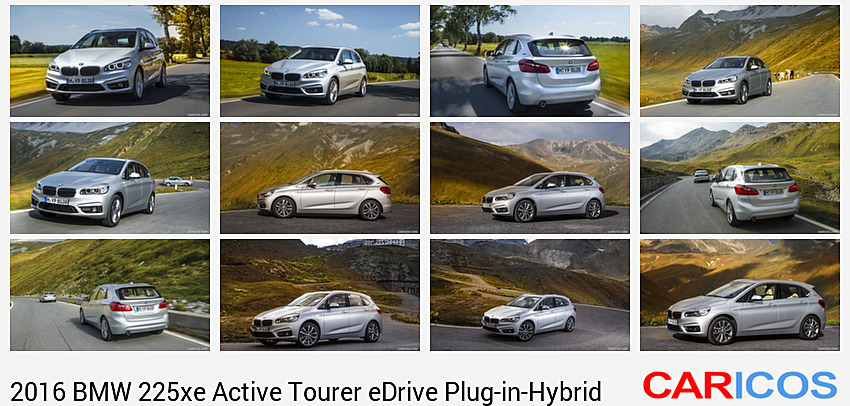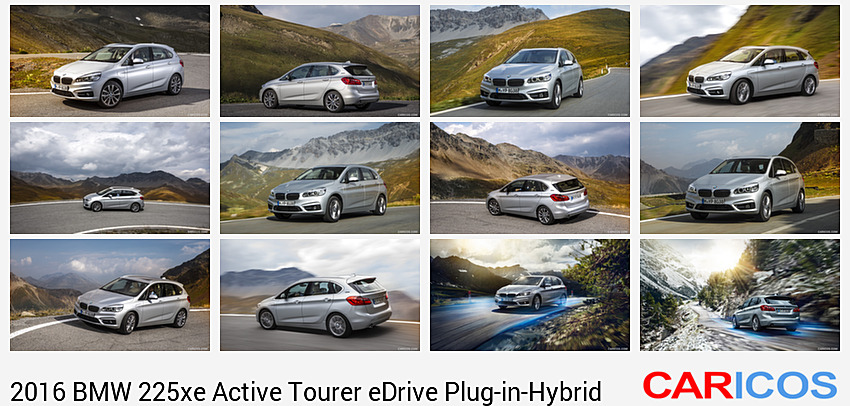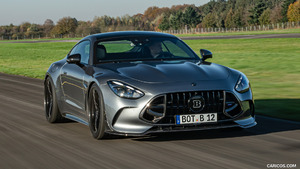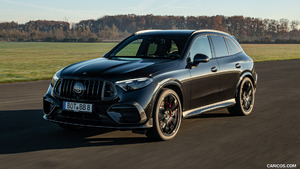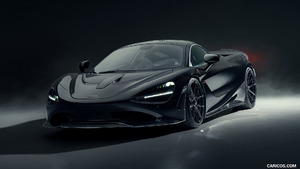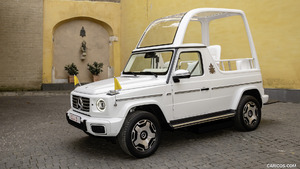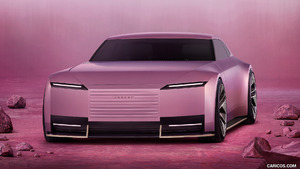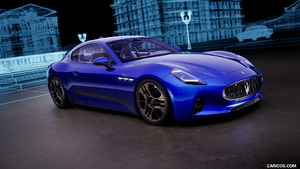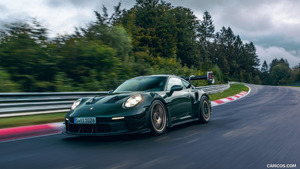BMW 225xe Active Tourer eDrive Plug-in-Hybrid
The innovative BMW eDrive technology in the new BMW 225xe and new BMW 330e once again underlines BMW’s leading role in the premium segment when it comes to powertrain electrification. BMW eDrive technology includes a number of cutting-edge plug-in hybrid components and makes a significant contribution to reducing fuel consumption and emissions. BMW eDrive is one of the most cutting-edge elements of the groundbreaking BMW EfficientDynamics suite of technology.
Locally emission-free driving.
BMW eDrive is the new drive system technology used in all the electrically powered vehicles from BMW i and the plug-in hybrid models from BMW. As well as outstanding efficiency and seamless everyday practicality, BMW eDrive also delivers the highest standards in driving dynamics and quality, in keeping with BMW tradition. Alongside BMW TwinPower Turbo technology for combustion engines, intelligent lightweight design and optimised aerodynamics, BMW eDrive technology is therefore one of the most important elements in the EfficientDynamics strategy designed to increase power and further reduce fuel consumption and CO2 emissions. In addition, BMW eDrive offers the option of driving on electric power alone and therefore with zero local emissions – yet at the same time reveals the ability to cover long distances when the two drive systems team up.
Moreover, BMW eDrive technology ensures extremely dynamic acceleration off the line thanks to the instantaneous responses of the electric motor, which generates its remarkable torque from the word go. Plus, the eBoost function, which pools the torque of both drive systems under acceleration, serves up BMW’s signature driving pleasure, whatever the conditions.
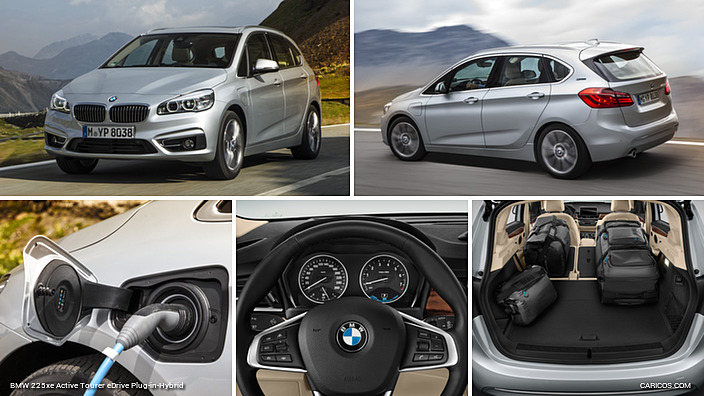 2016 BMW 225xe Active Tourer eDrive Plug-in-Hybrid
2016 BMW 225xe Active Tourer eDrive Plug-in-Hybrid
Designed for different vehicle concepts.
The most important components of BMW eDrive technology are the synchronous electric motor (including the power electronics developed by BMW), the lithium-ion high-voltage battery and intelligent energy management. The latter ensures the electric motor and combustion engine in plug-in hybrid models work together as effectively as possible according to the situation at hand.
Developed initially for the all-electric BMW i3 and BMW i8 plug-in hybrid sports car – which duly led the way in electric mobility in the premium sector – the modular structure of BMW eDrive technology sets it up perfectly for use in various vehicle concepts and segments. BMW uses its plentiful technical experience and customer feedback in the development of the latest BMW eDrive models. The fine-tuning of vehicle-specific elements, such as the battery cells, cooling management, power electronics and operating strategy, has involved the transfer of knowledge from the BMW i3 and BMW i8 to the development of new BMW eDrive models. Here, all components are adapted precisely to the vehicle at hand and optimised in terms of performance, efficiency, safety and durability. Moreover, BMW eDrive technology enables the electrified xDrive concept first featured in the BMW i8 to be executed with great efficiency.
BMW eDrive: familiar BMW character, flexible usage options.
BMW eDrive technology essentially spans the electric motor, the lithium-ion high-voltage battery and the power electronics. Based on a shared eBoost strategy, all BMW plug-in hybrid models offer supreme power delivery by bringing together their two drive systems, and elevate the responsiveness of BMW TwinPower Turbo technology to another new level. BMW eDrive makes all-electric driving in urban areas and over cross-country routes a marketable proposition. An important element of the operating strategy is the needoriented use of externally sourced and recuperated electric energy to maximise the vehicle’s efficiency. The components of the BMW eDrive architecture are tailored to each particular vehicle concept and can be combined with four- and three-cylinder petrol engines as well as with classical rear-wheel drive, BMW xDrive or electrified all-wheel drive.
The eDrive components developed as part of the BMW i projects will soon be integrated into other model ranges from the core brands. This scalable architecture also provides the platform required to offer plug-in hybrid vehicles at attractive prices on a par with those of conventionally powered variants of similar output. This means customers who opt for this advanced drive concept encounter not only the environmental benefits of electric mobility, but also economic plus-points.
Plug-in hybrid: energy management at its most intelligent.
In plug-in hybrid vehicles, intelligent energy management ensures the combustion engine and electric motor work together to maximum effect in all driving situations. Their operating strategy is based on the vehicle starting up on electric power only. BMW’s plug-in hybrid vehicles prioritise electric mode at low and moderate speeds, which allows them to exploit the benefits of the locally emission-free electric drive system. Under greater acceleration and at higher speeds, however, the combustion engine also joins the action. The boost function pools the torque of both drive systems to maximise the car’s dynamic performance and lend it remarkable poise and assurance.
BMW eDrive ensures that the combustion engine runs efficiently (electric assist) at higher speeds as well. This allows a reduction in fuel consumption on brisk cross-country or motorway runs, for example. And when the route guidance function of the car’s navigation system is activated, the proactive function initiates an anticipatory operating strategy which optimises efficiency and maximises the electric driving experience.
Like the BMW i8, the BMW X5 xDrive40e, BMW 330e and BMW 740e can all – at the touch of a button in MAX eDRIVE mode – run on purely electric power up to 120 km/h (75 mph), the BMW 225xe up to 125 km/h (78 mph). Here, the combustion engine only comes into play when the accelerator’s kickdown threshold is passed. In SAVE BATTERY mode the battery’s charge can be maintained to enable electric driving later on in the journey. If the charge level drops below 50 per cent, the battery is replenished. If the selector lever is moved into the S gate, the combustion engine starts up regardless of the mode engaged, ensuring sustained availability of the combined maximum output of the two drive systems. In addition, the battery’s charge is raised to 80 per cent.
With the addition of the BMW eDrive functions, the ECO PRO, COMFORT and SPORT driving experience modes are now even more clearly defined than on conventional vehicles.
Fast and convenient battery charging.
The high-voltage batteries of the new BMW plug-in hybrid models can be charged extremely easily, conveniently and quickly – both at home and while on the move – using BMW 360° ELECTRIC solutions. The battery can be powered up again from a domestic socket using the standard charging cable supplied or from a BMW i Wallbox (charging power: 3.7 kW). When it comes to topping up the battery during a journey, the BMW i mobility service, ChargeNow, gives customers access to the world’s largest public charging network of over 30,000 charging points run by partners in 22 countries. Higher performance, lower fuel consumption.
The new BMW plug-in hybrid models with eDrive technology – such as the new BMW X5 xDrive40e, the BMW 225xe and BMW 330e currently making their debuts, and the BMW 740e due for launch in the near future – are once again setting the benchmark in the various corners of the premium segment when it comes to reducing fuel consumption, and will also meet the stipulations of international legislation in the future regarding CO2 emissions.
Moreover, their all-electric and therefore locally emission-free driving mode will also allow them to drive into city centre zones where entry is regulated. And yet the BMW plug-in hybrid models also deliver the hallmark BMW attributes of dynamic excellence, sporting ability and driving pleasure while offering the best performance in their respective segments.
The first of its kind.
BMW is adding a plug-in hybrid variant with all-wheel drive to the BMW 2 Series Active Tourer model range. The BMW 225xe – a BMW 2 Series Active Tourer variant with eDrive – delivers a combination of sporting ability, economy and everyday practicality unique in its segment. It allows locally emission-free driving without compromising on the driving pleasure you’d expect from BMW, and combines an electric driving experience and high operating range with functional excellence and everyday practicality. The BMW 225xe offers both a higher system output and more boot capacity than its competitors.
With its plug-in hybrid drive system, the BMW 225xe combines BMW EfficientDynamics with comfort, driving pleasure and all-wheel drive, and brings versatility and generous levels of space together in a compact vehicle. The BMW 225xe uses its combination of BMW eDrive and a 1.5-litre threecylinder BMW TwinPower Turbo engine to offer both an electric driving experience and unrestricted mobility. Its combined fuel consumption of 2.1– 2.0 litres* per 100 kilometres / 134.5–141.2 mpg imp (CO2 emissions are just 49–46 grams* per kilometre) sets the benchmark in its class.
The BMW 225xe’s plug-in hybrid technology enables locally emission-free driving but also allows owners to cover long distances when required. It is therefore perfectly suited for use in urban areas and for family leisure activities. Like all variants of the BMW 2 Series Active Tourer, the BMW 2 Series Active Tourer with eDrive also impresses with its generouslysized interior, practical details and ergonomic ease of use. Since the lithiumion battery is arranged in a space-saving position under the rear seat bench and the electric drive system is fully accommodated under the load compartment floor, the boot’s capacity can be used virtually without restriction.
Electric, efficient and dynamically accomplished.
The driving experience is an equally important element of BMW’s family and leisure cars as everyday practicality. However, the BMW 225xe takes enjoyment at the wheel to a whole new level again. The BMW eDrive technologies developed under the banner of BMW EfficientDynamics and a BMW TwinPower Turbo petrol engine team up to create an efficient and dynamically accomplished hybrid drive system which makes the perfect match for a BMW brand model: dynamically adept, locally emission-free thanks to the electric drive and efficient over long distances. The electric drive system at the rear axle joins forces with the BMW 2 Series Active Tourer’s regular front-wheel-drive configuration to form what we call “electrified xDrive”. The result is outstanding traction even in adverse weather conditions. The rear-mounted 65 kW/88 hp electric motor drives the rear wheels and allows an electric range of up to 41 kilometres (25 miles). This makes it the obvious emission-free drive option for short distances, urban traffic and, with a top speed of 125 km/h (78 mph) on electric power alone, cross-country routes and even motorways.
Front-wheel drive, rear-wheel drive or electrified xDrive.
The high-revving three-cylinder petrol engine with BMW TwinPower Turbo technology and an output of 100 kW/136 hp is standing by for longer journeys and when higher speeds are the order of the day. The combustion engine sends its power to the front wheels via a six-speed Steptronic transmission and represents a compelling proposition with its smooth running and 220 Newton metres (162 lb-ft) of torque available up to the 202 km/h (126 mph) top speed.
Under heavy acceleration from rest and for overtaking manoeuvres, the power from the two drive systems combines to give a system output of 165 kW/224 hp and peak torque of up to 385 Newton metres (284 lb-ft). All of which enables acceleration from 0–100 km/h (62 mph) in 6.7 seconds. As with the BMW i8, the hybrid drive system in the BMW 225xe creates an “electrified xDrive” system. When the driver accelerates, the combustion engine is activated by the high-voltage starter-generator almost imperceptibly and with no interruption in the flow of power.
In addition to the Driving Experience Control switch – with its SPORT, COMFORT and ECO PRO settings – familiar from other BMW models, the eDrive button in the centre console offers three driving modes: AUTO eDRIVE, MAX eDRIVE and SAVE BATTERY. AUTO eDRIVE is the basic setting activated when the car is started. It ensures the combustion engine and electric motor work together to optimum effect in all driving situations and gives a pure-electric top speed of 80 km/h (50 mph). MAX eDRIVE allows the car to run on the electric drive system alone up to a speed of 125 km/h (78 mph). With SAVE BATTERY, the charge of the highvoltage battery can be maintained or, if it’s already depleted, raised to over 50 per cent during a journey – so that the available electric range can be used later in urban areas, for example. BMW ConnectedDrive is also on hand to help lower fuel consumption. In the BMW 2 Series Active Tourer with eDrive, the ConnectedDrive package adds the proactive energy management function to the mix, which responds to the driving style and route profile to ensure the plug-in hybrid drive system is used as efficiently as possible. As a plug-in hybrid, the BMW 2 Series Active Tourer with eDrive can charge its lithium-ion high-voltage battery (capacity: 7.7 kWh) either by means of brake energy recuperation during a journey or when plugged into a domestic power socket (in three hours 15 minutes from empty) or the optional BMW i Wallbox (two hours 15 minutes from empty).
The electric drive components, including the high-voltage battery and electric motor, are produced at BMW Plant Dingolfing; series production of the BMW 225xe will begin in late 2015 at Plant Leipzig. Prices in Germany start at €37,800.
BMW eDrive and spatial functionality paired for the first time.
The BMW 2 Series Tourer models represent an important building block for future growth at BMW within the brand’s broad-based product portfolio. The BMW 2 Series Active Tourer and BMW 2 Series Gran Tourer provide customers with a wide selection of highly efficient, dynamically talented, spacious and practical vehicles, whose front- and all-wheel drive, petrol and diesel engines make them ideal for all kinds of leisure activities and ensure they are ready to meet the varied requirements of families. The BMW 225xe – a BMW 2 Series Active Tourer variant with eDrive – has been developed squarely as a hybrid-drive variant of the 2 Series Active Tourer. It is the first premium vehicle in the segment to feature a plug-in hybrid drive system, and its combination of everyday practicality, driving dynamics and efficiency is without parallel worldwide.
The unique concept underpinning the BMW 225xe brings together a raised seating position, compact exterior dimensions, a spacious interior with well thought-out functional features, and a BMW eDrive electric drive system working in tandem with a BMW TwinPower Turbo petrol engine.
Spacious, versatile and locally emission-free.
The cutting-edge front-wheel-drive concept employed by BMW for the 2 Series Active Tourer provides unbeatable space and functionality for a compact model. A raised seating position and comfortable entry and exit allows the BMW 225xe to impress in everyday use, while its compact exterior dimensions, spacious interior and enviable versatility also represent a compelling proposition.
The rear seat bench of the BMW 2 Series Active Tourer with eDrive is positioned 30 millimetres higher than in the other variants of the car, and the battery is mounted underneath. Finely graduated seat backrest adjustment, which comes as standard for the rear bench, provides extra variability. The primary boot capacity is identical to that of the conventionally powered variants of the 2 Series Active Tourer: overall load capacity is 400 litres. Two in one – plug-in hybrid technology.
The hybrid drive system in the BMW 225xe features a 100 kW/136 hp threecylinder engine with BMW TwinPower Turbo technology (fuel consumption combined: 2.1–2.0 l/100 km [134.5–141.2 mpg imp]; CO2 emissions combined: 49–46 g/km)*. A member of the new BMW engine family, the 1.5- litre unit, drives the front wheels via a six-speed Steptronic transmission and teams up with a 65 kW/88 hp electric motor at the rear axle, which offers a range of up to 41 kilometres (25 miles) on electric power alone. The lithiumion battery is arranged in a space-saving position under the rear seat bench and has a capacity of 7.7 kWh. The highly efficient use of space is complemented by front-wheel drive, rear-wheel drive or – with the two working together – electrified xDrive, as well as various operating and drive modes.
Optimised fuel consumption over short distances and in urban areas was a key objective in the development of the BMW 225xe’s plug-in hybrid drive system. For example, dynamic ability and efficiency in urban use were both key areas of focus in the development of the synchronous electric motor and its incorporation into the drive system via a single-speed transmission. When running on electric power only, the BMW 2 Series Active Tourer with eDrive drives like a rear-wheel-drive car. Its extra weight over the rear axle compared to 2 Series Active Tourer models fitted with only a petrol engine enables even more finely balanced weight distribution and, as a result, further enhanced driving dynamics.
The perfect interplay of drive components.
The electric motor has an ultra-high efficiency factor of up to 96 per cent. Added to which, the electric drive system’s instantaneous reactions from a standstill and high torque of 165 Newton metres (122 lb-ft) fit the hallmark dynamic profile of BMW vehicles like a glove and imbue the car with poise and assurance in the city and beyond.
Pure electric and therefore locally emission-free driving is possible up to a speed of 125 km/h (78 mph). At higher speeds, the BMW TwinPower Turbo petrol engine is brought almost imperceptibly into play by the integrated highvoltage starter-generator and the electric motor is decoupled. At motorway speeds, the BMW 225xe morphs into a purely front-drive car and can reach up to 202 km/h (126 mph).
In all other driving situations, the plug-in hybrid’s intelligent energy management ensures the combustion engine and electric motor combine to optimum effect. For example, a fundamental use for the electric energy generated by the motor is to minimise fuel consumption, providing authoritative and dynamic performance in the process.
When more acceleration is required, the boost function pools the torque of both drive systems to maximise the car’s dynamic performance and lend it remarkable poise and assurance. Even when the battery charge is no longer sufficient to drive the car on electric power alone, the starter-generator releases an extra dose of electric energy to enhance acceleration using the electric rear axle.
When the combustion engine is engaged, the available electric energy is used to reduce fuel consumption and provide an electric “assist” function. The intelligent activation of the rear axle’s electric motor allows the engine to operate at a reduced load and therefore in a more efficient area of its operating range. That means fuel consumption is reduced, even on crosscountry journeys or motorways when travelling at up to 125 km/h (78 mph).
The high-voltage starter-generator takes on a multi-tasking role in the BMW 225xe. Integrated via a belt drive, it starts up the combustion engine and can provide a brief power boost when accelerating from a standstill with its peak torque of 150 Newton metres (111 lb-ft). It also serves as a generator under braking and on the overrun and uses brake energy recuperation to feed energy back into the 7.7 kWh lithium-ion battery. In addition, the combustion engine uses the integrated high-voltage starter-generator to charge the batteries during a journey, if required.
Electric driving modes plus Driving Experience Control switch.
Drivers of the BMW 2 Series Active Tourer with eDrive can choose from three distinct electric driving modes. AUTO eDRIVE mode is the hybrid drive system’s default setting when setting off and ensures the electric motor and BMW TwinTurbo combustion engine work to optimum effect, as the battery’s charge level permits. In this mode the BMW 225xe can be driven at up to 80 km/h (50 mph) on electric power alone, and the electric energy summoned by the driver is displayed on the instrument cluster. If they request more power – e.g. when accelerating or at speeds above 80 km/h (50 mph) – the combustion engine is engaged automatically and without adversely affecting comfort. If the car’s speed drops back down below 80 km/h (50 mph), the combustion engine is decoupled and switched off, and the car reverts to electric power only. The car can even continue to run on electric power under light acceleration up to 55 km/h (34 mph) if the battery’s charge drops below seven per cent. If its charge falls to below three per cent, the combustion engine cuts in once again.
Like the BMW i8 plug-in hybrid sports car, the BMW 225xe offers a MAX eDRIVE driving mode. At the touch of a button the car can use the electric drive system’s maximum output to drive emission-free up to a speed of 125 km/h (78 mph). The electric power can be metered out easily throughout the accelerator’s range without the combustion engine starting up (against the wishes of the driver). In this mode the BMW TwinPower Turbo petrol engine only comes into play when the accelerator’s kickdown threshold is passed. Total system output can be summoned up virtually instantaneously, if required. The three-cylinder engine can also be activated by pushing the selector lever into “S”. Here, the drive system delivers maximum sports performance by making the full power of the electric motor and combustion engine combined (overboost included) available to the driver.
Activating the SAVE BATTERY mode allows the driver to maintain the charge of the high-voltage battery to maximise the electric range for locally emissionfree driving later on in the journey. If SAVE BATTERY mode is activated when the battery’s charge is below 50 per cent, the charge is automatically increased to a maximum 50 per cent. If the high-voltage battery is running at over 50 per cent charge when this mode is engaged, its level of charge is maintained. If the selector lever is moved into the S gate, the combustion engine starts up regardless of the mode engaged, ensuring that availability of the combined maximum output of the two drive systems is sustained. In addition, the highvoltage battery’s charge is raised to 80 per cent.
Driving Experience Control switch allows the drive system’s responses to be adjusted even more precisely to personal tastes.
The three eDrive modes can be matched in any configuration with the settings offered by the Driving Experience Control switch familiar from other BMW models. The SPORT, COMFORT and ECO PRO driving experience modes cover all areas of the car, adjusting the accelerator’s responses, the shift characteristics of the Steptronic transmission and the steering alike. For example, the drive system and chassis have sportier characteristics in SPORT mode than in the default COMFORT setting. ECO PRO mode adjusts the car’s energy and on-board climate management intelligently and switches off or reduces the performance of electric consumers like the exterior mirror and seat heating, for example. And in addition to changes to the accelerator responses and the optimisation of the gearshift program, the coasting function in ECO PRO mode enables further potential for energy saving.
When linking up with the eDrive modes, the ECO PRO, COMFORT and SPORT Driving Experience Control modes address all the hybrid functions – such as electric driving, energy recuperation, electric assist and the boost function – in order to optimise the driving experience.
Electrified xDrive system: agile and efficient.
The electrified xDrive system enabled by the BMW 225xe’s plug-in hybrid drive concept builds on the experience gained with the BMW i8 sports car. The electric motor and combustion engine only drive one axle each. But at speeds up to 125 km/h (78 mph), they also allow the driver to call on electrified all-wheel drive. With the electrically driven rear axle added to the conventionally powered Active Tourer’s front-wheel drive, traction is increased and the BMW 225xe’s handling remains neutral for longer than the models with only front-wheel drive can claim. A further improvement in driving dynamics is the result. Moreover, the hybrid drive system removes the need for the driven axles to be connected by a drive shaft.
Battery can be charged easily at home or during a journey using BMW 360° ELECTRIC solutions.
As a plug-in hybrid, the BMW 225xe can also be charged externally via the mains power supply. The car’s lithium-ion high-voltage battery can be replenished in just two hours and 15 minutes using a BMW i Wallbox (charging power: 3.7 kW, can be installed at home or the workplace), so that the car’s maximum electric range is available when the driver is ready to set off. Alternatively, the BMW 225xe can also be charged in three hours and 15 minutes from a conventional domestic power socket using the standard charging cable supplied. The charging solutions available from BMW 360° ELECTRIC allow the high-voltage battery for the BMW 225xe to be charged during the course of a journey. The ChargeNow mobility service opens up access to the largest pool of public charging station suppliers (covering over 30,000 charging stations in 22 countries). BMW ConnectedDrive, the BMW ConnectedDrive app or ChargeNow app make locating and using public charging stations an extremely fast and easy process, while the ChargeNow card allows convenient use and cash-free payment.
If the battery is empty but a stationary charging option is not available, activating the eDrive button in SAVE BATTERY mode allows its charge to be brought up to at least 50 per cent while on the move.
Keeping up to speed remotely with BMW ConnectedDrive.
BMW ConnectedDrive is all about the link-up of the driver, vehicle and outside world. In the BMW 2 Series Active Tourer with eDrive the system enables access to the most important vehicle information at any time. Inside the car, the driver can call up data such as the charge level and journey distances covered on the display or pre-set a temperature for the passenger compartment. As well as the air conditioning system to cool the interior, a programmable auxiliary heating system is also on hand. Running these functions while the car is charging does not restrict its electric range.
These on-board functions can be managed either inside the car or remotely from a smartphone using the BMW ConnectedDrive app. This allows the doors to be locked, for example, while the driver can also use it to check whether the windows are closed. In addition, destinations and points of interest can be sent to the navigation system and used for route guidance without further ado.
Proactive energy management.
A proactive energy management system has also been incorporated into the BMW 225xe via the navigation system. The system analyses the nature of the route entered into the route guidance function, including inclines and descents, speed limits and real-time traffic information, throughout the journey. The system uses this data and the individual driving style to guide the driver onto the route that will allow the hybrid drive system to be used to maximum efficiency. Recuperation phases are employed as effectively as possible, so that the car’s maximum electric range is available to the driver at his or her destination – e.g. in a city.
Production – expertise from Dingolfing and Leipzig.
The high-voltage battery and electric motor for the new BMW 2 Series Active Tourer with eDrive are produced at the BMW Group’s plant in Dingolfing. As well as the BMW 3 Series, 4 Series, 5 Series, 6 Series and 7 Series model ranges, Dingolfing also handles the manufacture of chassis parts and electric drive components; the high-voltage batteries for the BMW i models are already made at Dingolfing, for example. The manufacture of eDrive components for plug-in hybrid models is further promoting the development of the facility into a centre of expertise for electric drive system components. Know-how from the development of the BMW i models has been channelled into the production of the BMW eDrive components for the BMW 225xe. The intelligent BMW eDrive modular system, meanwhile, allows the components to be produced extremely flexibly and efficiently.
The integration of the electric drive components will take place at BMW Plant Leipzig, where series production of the BMW 225xe will begin in late 2015. Prices in Germany for the BMW 225xe start at €37,800.

